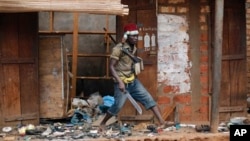A senior United Nations official said he sees hopeful signs of reconciliation beginning to emerge in war-torn Central African Republic.
Abdoulaye Mar Dieye, head of the Africa Bureau at the U.N. Development Program, told VOA it is vital for the international community to maintain support for CAR as it enters a critical period of transition toward a more stable, democratic society.
The UNDP’s Africa bureau chief has recently returned from a weeklong visit to Central African Republic to assess what his and other U.N. agencies are doing to support the country’s fragile peace process.
Dieye said great difficulties lie ahead for peace and reconciliation to take root as the population remains traumatized, deeply divided and mistrustful of the state.
Sense of hope
Despite this, he said there is a sense of hope and collective willingness to revive the country’s shattered communities and economy.
“The country is coming a long way. I have seen…some green shoots in peace and security. I have seen the economy starting slowly to revive itself. I have spoken with the youth and I have felt less anger, although there is still deep trauma. I have seen hope from everybody to rebuild the nation. So, this is very important,” Dieye said.
The government is pinning its hopes for achieving a more stable, economically viable society on next month’s peace-building Bangui Forum.
The national gathering will lay the groundwork for a planned constitutional referendum as well as legislative and presidential elections scheduled for August.
Its longer term aim is to start a reconciliation process for all levels of society.
Thousands of people have been killed since December 2012 when the mainly Muslim Seleka rebels launched attacks to overthrow the government of Francois Bozize.
The United Nations estimated the conflict has uprooted more than 438,000 people within the CAR and forced more than 423,000 others to flee to neighboring countries.
The formation of the Christian anti-Balaka militia has increased the sectarian nature of the conflict, creating a religious divide in a country where this did not formerly exist.
No Muslim-Christian crisis
Dieye said there is no Muslim-Christian crisis in the country. He said religion has been manipulated by political leaders for opportunistic reasons and ultimately will have no sway over the population.
“The population has always been living side-to-side and a lot of intermarriages are there. … And, these pre-consultations leading to the forum of Bangui have been a great therapy to bring this nation together and I am convinced that when they go to the Bangui Forum, the therapy will be even deeper and that will open the ground for recovery and development for this nation. And, they deserve it,” he said.
Dieye said eradicating exclusion and rebuilding the country’s economy is key to ending the violence in CAR.
He added the country’s development prospects hinge on restoring security, creating a strong state authority and including all segments of society, in particular young people and women.
In the meantime, Dieye said more than half of the country’s population of 4.9 million is in need of emergency assistance.
Therefore, he said it is crucial for the international community to continue its financial support for this potentially rich, but currently impoverished country.











